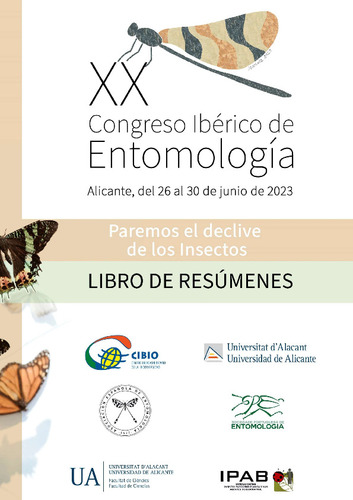An updated and agreed-upon proposal for the common names of dragonflies and damselflies in Spanish
Palabra(s) clave:
Insectos
Biodiversidad
Educación Ambiental
Libélulas
Odonata
Insects
Biodiversity
Environmental Education
Entomology
Entomología
Dragonflies
Fecha de publicación:
Editorial:
CIBIO, Asociación española de Entomología, Sociedade Portuguesa de Entomologia
Descripción física:
Resumen:
Odonata (dragonflies) is one of the most attractive Order of insects for nature enthusiasts, photographers, and wildlife observers. It is worth noting that unlike all other European countries, there is not yet a widely accepted list of common names in Spanish for dragonfly species present in Spain. Among international organizations, IUCN has asked for such names in Spanish. In recent years, some citizen science publications and web portals have incorporated the use of common names for dragonflies, albeit with a lack of standardization. In 2015, a reasoned proposal was presented at the I Iberian Symposium of Odonatology held in Córdoba, but it did not include species found exclusively in the Canary Islands. Although this first proposal generated an enriching debate, it also had some reservations. In 2021, at the III Iberian Symposium of Odonatology held in Irún, another proposal was presented in order to stimulate the need for agreement on Spanish dragonflies common names. In the following weeks, the Grupo Ibérico de Odonatología called for participation and created a working group with the goal of creating such a consensus list. This working group is currently reviewing the 2015 and 2021 proposals, considering the existing names in Catalan (2016) and Galician (2012). As a result, a consensus list has been elaborated for the 82 Ibero-balear species, plus 4 species exclusive to the Canaries within Spain.
Odonata (dragonflies) is one of the most attractive Order of insects for nature enthusiasts, photographers, and wildlife observers. It is worth noting that unlike all other European countries, there is not yet a widely accepted list of common names in Spanish for dragonfly species present in Spain. Among international organizations, IUCN has asked for such names in Spanish. In recent years, some citizen science publications and web portals have incorporated the use of common names for dragonflies, albeit with a lack of standardization. In 2015, a reasoned proposal was presented at the I Iberian Symposium of Odonatology held in Córdoba, but it did not include species found exclusively in the Canary Islands. Although this first proposal generated an enriching debate, it also had some reservations. In 2021, at the III Iberian Symposium of Odonatology held in Irún, another proposal was presented in order to stimulate the need for agreement on Spanish dragonflies common names. In the following weeks, the Grupo Ibérico de Odonatología called for participation and created a working group with the goal of creating such a consensus list. This working group is currently reviewing the 2015 and 2021 proposals, considering the existing names in Catalan (2016) and Galician (2012). As a result, a consensus list has been elaborated for the 82 Ibero-balear species, plus 4 species exclusive to the Canaries within Spain.
Descripción:
Congreso Ibérico de Entomología (20º. 2023. Alicante)
Colecciones
- Ciencias de la Educación [1070]
- Indurot [171]
- Ponencias, Discursos y Conferencias [4231]
Ficheros en el ítem




